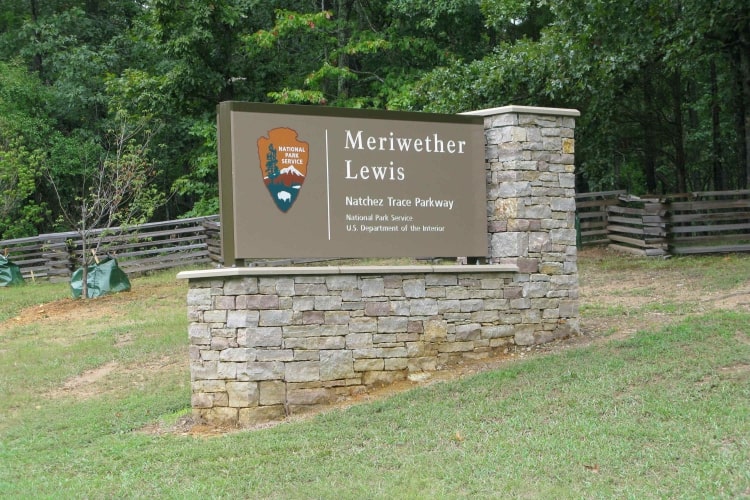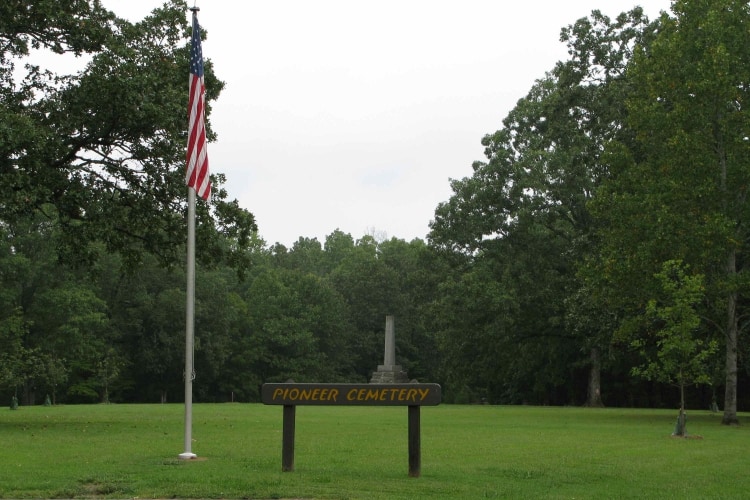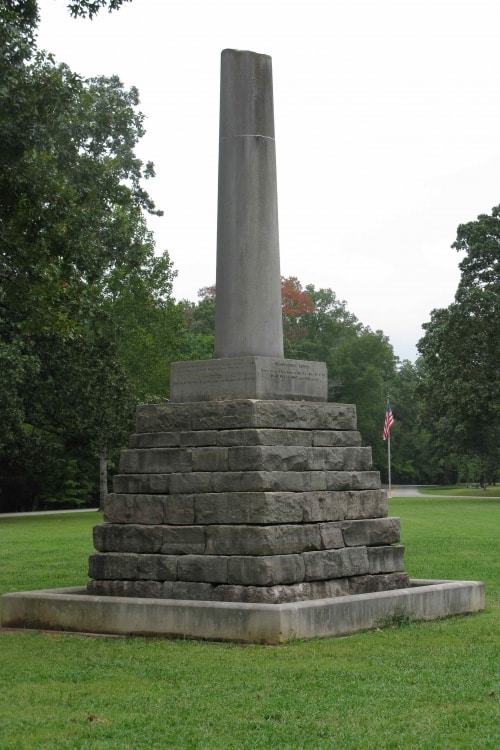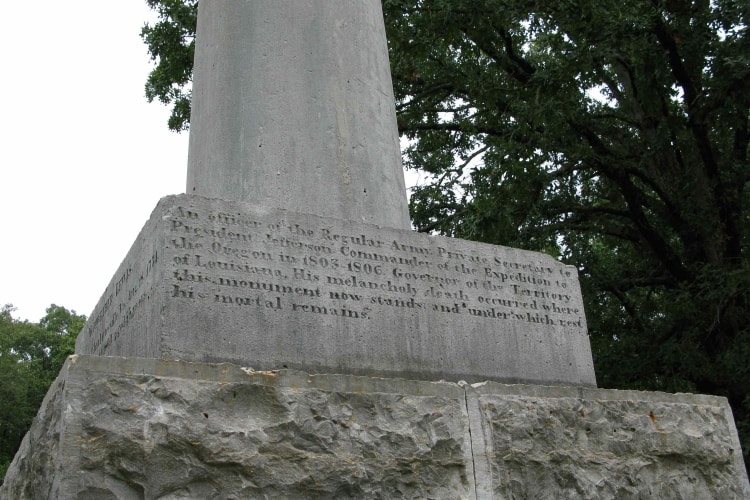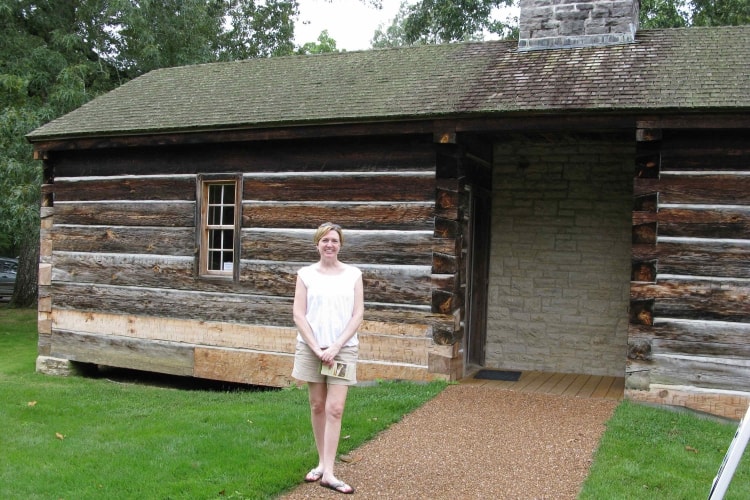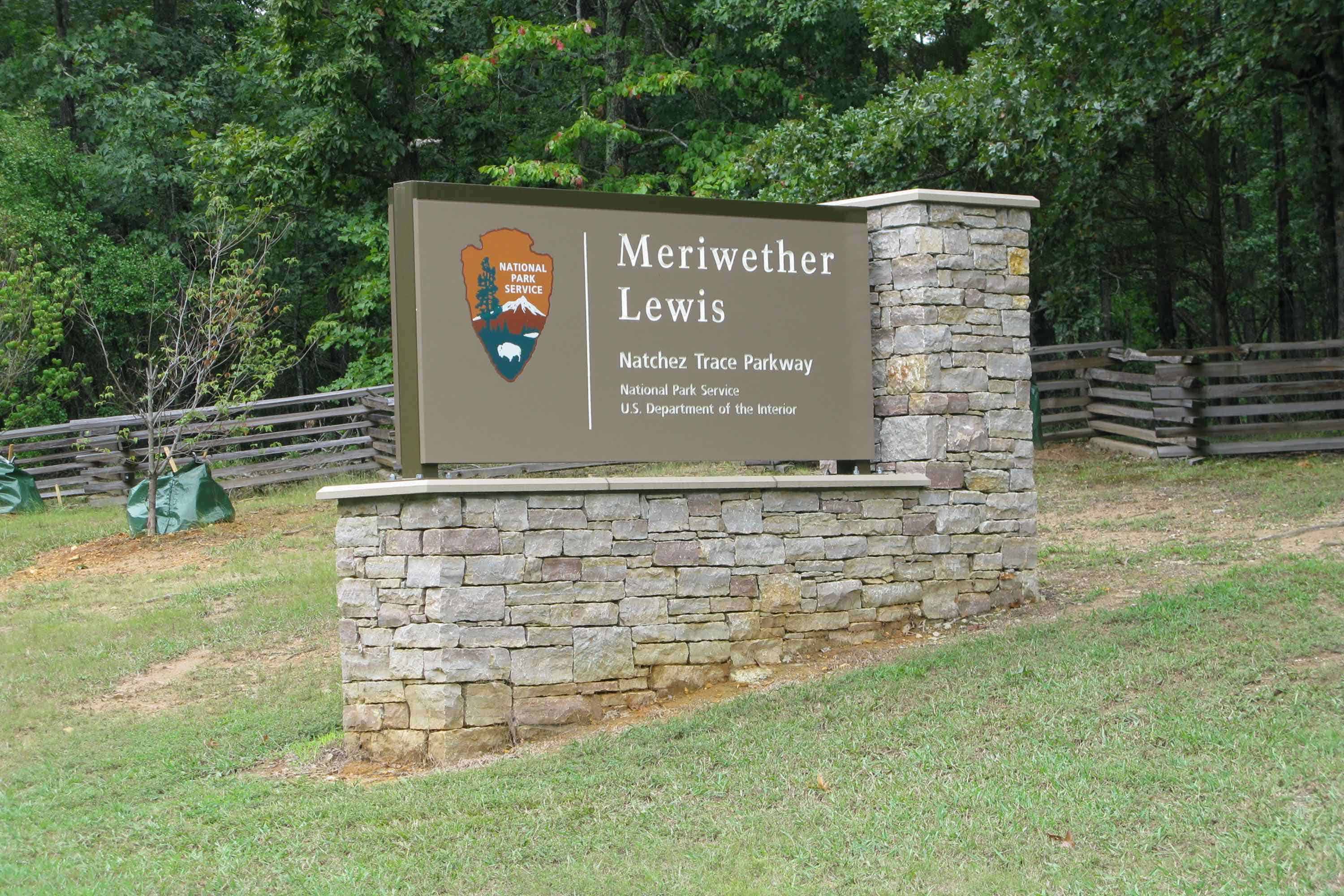
This morning we decided we would have breakfast at Dotson’s and then hit the Natchez Trace Parkway to see the monument of famed explorer, Merriweather Lewis. Part of the illustrious Lewis & Clark expedition, you can visit his grave site at milepost 385.9 right off the Trace. Here’s the history and the legend:
The Corps of Discovery
When Thomas Jefferson was looking for a strong, bold leader to explore the northwest in search of an all-water connection between the Missouri River and the Pacific Ocean, he found an eager volunteer in his personal secretary, Meriwether Lewis. Jefferson agreed that Lewis was the man for the job, and on May 14, 1804, the Corps of Discovery left St. Louis. The 2.3 year, 8,000 mile tour failed to find a continuous waterway to the Pacific, but it succeeded spectacularly in accumulating massive amounts of geographical, cultural, and biological information. This information, though familiar to the resident American Indians and the French and British trappers in the northwest, was previously unknown to scientists.After the Expedition
After the expedition returned home, Jefferson rewarded Lewis with the governorship of the Louisiana Territory. On September 3, 1809, Lewis set out for Washington D.C., where he hoped to resolve issues regarding the denied payment of drafts he had drawn against the War Department while serving as the first American governor of the Louisiana Territory. Some accounts say he carried his journals with him for delivery to his publisher. Lewis intended to travel to Washington by ship from New Orleans, but changed his plans while en route down the Mississippi from St. Louis. He decided to make an overland journey via the Natchez Trace and then east to Washington. The Natchez Trace was the old pioneer road between Natchez, Mississippi and Nashville. On October 10, 1809 Lewis stopped at an inn on the Natchez Trace called Grinder’s Stand, about 70 miles southwest of Nashville. After leaving dinner, he went to his bedroom. In the predawn hours of October 11, the innkeeper heard gunshots. Servants found Lewis badly injured from multiple gunshot wounds, including one to the head. He died shortly after sunrise.While modern historians generally accept his death as a suicide, there is some debate. Priscilla Grinder, the tavern-keeper’s wife, claimed Lewis acted strangely the night before his death. She said that during dinner, Lewis stood and paced about the room talking to himself in the way one would speak to a lawyer. She observed his face to flush as if it had come on him in a fit. After he retired for the evening, she continued to hear him talking to himself. At some point in the night, she heard multiple gunshots, and what she believed was someone calling for help. She claimed to be able to see Lewis through the slit in the door crawling back to his room. She never explained why, at the time, she didn’t investigate further concerning Lewis’ condition or the source of the gunshots. The next morning, she sent for Lewis’ servants. They found him wounded and bloody, with part of his skull gone, but he lived for several hours. Priscilla Grinder’s testimony is held as a point of contention from both sides of the murder-suicide debate. The murder advocates point to five conflicting testimonies as evidence that hers is fabricated, and the suicide advocates point to her testimony as proof of suicide. Did he commit suicide, or was he murdered? The debate still goes on today.
The only doctor to examine Lewis’ body did so in 1848. He reported that Lewis appeared to have died “by the hand of an assassin”. Lewis’ descendants have retained the report. From 1993–2010, many of Lewis’ kin (through his sister Jane, as he had no children) sought to have the body exhumed for forensic analysis, to try to determine whether the death was a suicide. A Tennessee coroner’s jury in 1996 recommended exhumation. Since Lewis is buried in a national park, the National Park Service must approve; they refused the request in 1998, citing possible disturbance to the bodies of more than 100 pioneers buried nearby. In 2008 the Department of Interior approved the exhumation, but that decision was rescinded in 2010 upon policy review, and the Department has stated the last decision is final.
The Memorial
Meriwether Lewis was buried near Grinder’s Stand, and, in 1848, the State of Tennessee erected a memorial to honor him. A simple erect, broken shaft reaches above the stone base, symbolizing a life cut short. The memorial includes several inscriptions, one in Latin. “Immaturus obi; sed tu felicior annos vive meos: Bona Republica! vive tuos.” “I died before my time, but thou O great and good Republic, live out my years while you live out your own.”Four years after Lewis’ death, Thomas Jefferson wrote: “Of courage undaunted, possessing a firmness and perseverance of purpose which nothing but impossibilities could divert from its direction, … honest, disinterested, liberal, of sound understanding and a fidelity to truth so scrupulous that whatever he should report would be as certain as if seen by ourselves, with all these qualifications as if selected and implanted by nature in one body for this express purpose, I could have no hesitation in confiding the enterprise to him.”
One other tidbit of note, Lewis County, TN was named for him as a tribute to his life and the contributions he made to the exploration of this country.
After the visiting the memorial we decided to head to Hohenwald for a late afternoon snack. Before leaving, I looked up restaurants in Hohenwald and found a great review for burgers and milkshakes at the local Dairy Dip so we headed that way. Unbeknownst to us, because of the Labor holiday, the sidewalks were rolled up and the town practically deserted. No restaurants or stores were open. We found the Dairy Dip and it was a definite dud. Dilapidated, worn out and tired looking. I think it was permanently closed for business and not just for Labor Day. So much for the internet.
We decided to drive through Centerville on our way home for a different travel perspective. Again, everything was closed so after circling the square we headed toward home. While trying to decide exactly which way we were going to go, Dad and Janice called to tell us what a wonderful time they were having in Highland, NC. They were sitting in adirondack chairs, by a beautiful pond, enjoying the sunset and a scenic mountain view. I, on the other hand, was exiting a McDonald’s having had to stop to use their facilities since every restaurant in the state was apparently closed.
Back on the Natchez Trace we drove home in a steady rain. Jasper was super excited to see us when we arrived home. Tired from traveling we fell asleep on the couch. By the time we woke up the steady drizzle had turned into a drowning downpour so there was no grilling for us tonight. Since we were to pooped to grill anyway, we scrounged and had leftovers for dinner.


